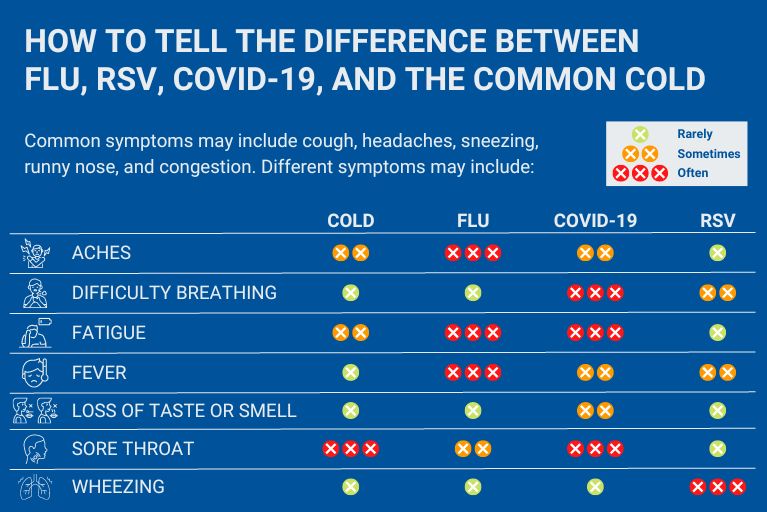
Respiratory viral infections continue to be a major health concern in Singapore, particularly affecting young children, older adults, and individuals with existing medical conditions. As viruses evolve, preventive strategies—particularly vaccinations continuously updated to remain effective.
Infectious Diseases Specialist Dr. Lee Tau Hong shares what you need to know in 2025 about vaccinations for COVID-19, Influenza, and Respiratory Syncytial Virus (RSV).
COVID-19 is a respiratory disease caused by the severe acute respiratory syndrome coronavirus 2 (SARS-CoV-2). It spreads mainly through respiratory droplets or tiny particles released when an infected person coughs, sneezes, talks or sings. Other people may breathe in these droplets or particles, or it may land on their mouth, nose or eyes.
Signs and symptoms of COVID-19 may vary and range from mild respiratory symptoms to severe illnesses. Common symptoms include:
Even in 2025, hospital admissions due to COVID-19 remain higher than those for influenza and RSV. Despite Singapore’s high vaccination rates, newer variants continue to emerge. The Ministry of Health (MOH) and the Communicable Diseases Agency (CDA) reported 14,200 cases from April 27 to May 3—up from 11,100 the week before.
Given the situation, regular booster shots are increasingly important for optimal protection.
Singapore’s Ministry of Health recommends annual COVID-19 vaccinations for:
Healthcare workers and persons living or working with medically vulnerable individuals are recommended to receive the vaccine.
The booster should be given approximately once a year, with at least a five-month gap from the previous dose.
As new variants of concern (VOCs) emerge, vaccines are updated to maintain effectiveness. In early 2025, updated vaccines targeting the JN.1 variant were rolled out in line with MOH guidelines. They mention that at present, LF.7 and NB.1.8 (both descendants of the JN.1 variant) are the main COVID-19 variants circulating in Singapore, and account for more than two-thirds of the locally sequenced cases reported.
Until those vaccines become available, formulations targeting JN.1 or KP.2 are still considered protective and are recommended.
Seasonal influenza, commonly referred to as the flu, is an acute respiratory infection caused by the influenza virus. It can cause mild to severe symptoms, and in serious cases sometimes lead to death. The three main types of influenza virus are the Type A, B and C strains. Influenza A and B viruses circulate yearly in Singapore, with peaks observed in May to August and December to March.
In the first quarter of 2025, Singapore saw a rise in respiratory-related clinic visits. The most detected viruses were rhinovirus/enterovirus, found in 28% of children and 19% of adults tested.
Notably, the B/Yamagata strain of influenza has not been detected for several seasons, likely due to changes during the COVID-19 pandemic. This has prompted adjustments to the annual flu vaccine formulation.
The 2025 Flu Vaccine Includes:
Three updated strains, A/Victoria, A/Croatia, and B/Austria were identified by global health authorities as the most likely to circulate this year. Annual flu vaccination is still strongly advised, particularly for high-risk individuals such as children, the elderly, and those with chronic illnesses.
RSV (Respiratory Syncytial Virus) often starts with common cold-like symptoms such as runny nose, mild cough, or low-grade fever. However, in certain populations, RSV can lead to severe complications like:
Recent data from countries like Canada show increasing RSV-related mortality in older adults, often due to delayed diagnosis or underestimation of the virus’s severity.
Why Is RSV Underdiagnosed?
Due to symptoms similar to the common cold, RSV is often underrecognised and underdiagnosed. Healthcare providers may also not be aware of the severity of RSV infections and do not consider it a potential pathogen to look out for.
Diagnostic testing for RSV in adults is also not routine and is usually only performed in severe or hospitalised cases.
A delayed diagnosis may result in a high burden being placed on both inpatient and outpatient healthcare resources due to the longer-term effects of RSV. This includes multiple visits to healthcare providers for recurrent post-infectious wheezing or worsening of pre-existing conditions.
In recent years, substantial progress has been made in RSV vaccine development. Vaccine options are now available from manufacturers such as GSK, Pfizer, and Moderna.
• For Pregnant Women: Since November 2024, the Abrysvo vaccine has been available in Singapore to protect infants through maternal antibodies passed on during pregnancy.
For Older Adults: The U.S. Advisory Committee on Immunization Practices (ACIP) now recommends a single-dose RSV vaccine for adults aged 75 and older, as well as those aged 60–74 with chronic medical conditions or risk factors for severe RSV infection.
Telling Them Apart
As COVID-19, influenza (flu) and RSV share similar symptoms, it may be difficult to tell them apart. To properly diagnose the condition, healthcare providers may need to perform a diagnostic test.
 Credit: National Foundation for Infectious Diseases
Credit: National Foundation for Infectious Diseases
Vaccination remains one of the most effective strategies to reduce the severity and spread of respiratory infections. As we move into 2025, keeping up with updated vaccines for COVID-19, Influenza, and RSV will be crucial, especially for those in higher-risk groups.
If you or your loved ones fall into any of the recommended categories, speak to your healthcare provider about your next vaccine.